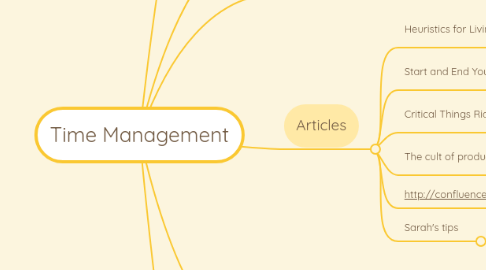
1. "No one is always that busy. It just depends on what number you’re on their priority list"
1.1. “You can’t let other people set your agenda in life” -- Warren Buffett
1.1.1. There are 168 hours every week
1.2. “Either you run the day or the day runs you.” -- Jim Rohn
1.2.1. If you have clarity of purpose every morning, your focus will change
1.2.2. “How we spend our days is, of course, how we spend our lives.” -- Annie Dillard
1.2.2.1. Productivity isn’t a goal, but rather a tool for better achieving our goals
1.2.2.2. The reason we really care about productivity—or the reason we should care—is that it allows us to do the things we care about as well and effectively as possible
1.3. “You have to decide what your highest priorities are and have the courage pleasantly, smilingly, and non-apologetically — to say “no” to other things. And the way to do that is by having a bigger yes burning inside.” -- Stephen Covey
1.3.1. "'Everyone is too busy' is a cultural symptom of a lack of clear strategy and prioritisation process. Need an objective process for saying 'No'" -- Jeff Gothelf
1.4. The more you try to do, the less you actually accomplish
1.4.1. There will always be more good ideas than you have the capacity to execute
1.4.1.1. There will always be more good ideas than you have the capacity to execute
1.4.2. Focus on less so that you/your team can achieve more
1.4.3. If you’re currently trying to execute five, ten, or even twenty important goals, the truth is that you/your team can’t focus
1.4.4. This lack of focus magnifies the intensity of the whirlwind, dilutes your efforts, and makes success almost impossible
2. Guidelines
2.1. What is the ONE THING I am committed to completing today?
2.1.1. Here’s why it’s beneficial:
2.1.1.1. You train your brain to focus on what is most important
2.1.1.2. You gain a sense of purpose
2.1.1.3. You save yourself time
2.2. What are the TWO or THREE things I am committed to completing this week?
2.2.1. Under each goal, write down 3 things you would need to do to achieve the desired outcome
2.2.2. Devote blocks of time to making progress in the areas
2.2.2.1. Become the master of your time
2.2.2.1.1. Use pomodoro to create focus
2.2.2.1.2. Use don't disturb sign or find a quiet place
2.2.2.1.3. Become a pro at ignoring distractions
2.2.3. Do an assessment of the progress you made
2.2.3.1. Did some activities take more time than you anticipated?
2.2.3.2. Do you need to plan better?
2.2.3.3. What could you have improved
3. Tips
3.1. Work on the most mentally challenging tasks in the morning (2 hours after you get up)
3.2. Set time slot batches for monkey work, e.g emails, etc
3.3. Have regular scheduled “check-in” points during the day
3.4. Block out time slots for breaks and focus time
3.4.1. Allow slack time
3.5. When you focus, use 50 min time slots with 15 min breaks
3.5.1. a la pomodoro technique
3.5.1.1. It's important to note that a pomodoro is an indivisible unit of work
3.5.1.1.1. if you're are interrupted
3.5.1.1.2. Find a means to signal "Don't disturb"
3.5.1.1.3. Principle:
3.5.1.2. Cirillo suggests the "inform, negotiate and call back" strategy:
3.5.1.2.1. Inform the other (distracting) party that you're working on something right now.
3.5.1.2.2. Negotiate a time when you can get back to them about the distracting issue in a timely manner.
3.5.1.2.3. Schedule that follow-up immediately.
3.5.1.2.4. Call back the other party when your pomodoro is complete and you're ready to tackle their issue.
3.5.1.3. Of course, not every distraction is that simple, and some things demand immediate attention
3.5.1.4. Read more at https://www.lifehacker.com.au/2014/07/productivity-101-a-primer-to-the-pomodoro-technique/#Z54y8C5RmHJxlIJl.99
4. Articles
4.1. Heuristics for Living – Christina Wodtke – Medium
4.2. Start and End Your Workday With These Principles in Mind
4.3. Critical Things Ridiculously Successful People Do Every Day
4.4. The cult of productivity is preventing you from being productive
4.5. http://confluence.int.corp.sun/confluence/display/ALP/Making+Your+Day+Intentional+and+Less+Reactive
4.6. Sarah's tips
4.6.1. http://confluence.int.corp.sun/confluence/display/ALP/Time+Management
5. Authors
5.1. David Allen
5.1.1. "Getting Things Done: The Art of Stress-Free Productivity"
5.2. Brian Tracy
5.2.1. "Eat That Frog!: 21 Great Ways to Stop Procrastinating and Get More Done in Less Time"
5.3. Marie Kondo
5.3.1. "The Life-Changing Magic of Tidying Up: The Japanese Art of Decluttering and Organizing"
6. It's a question of:
6.1. Setting priorities
6.1.1. Saying no to anything that isn't most important
6.2. Setting goals
6.2.1. Being intentional
6.3. Maintaining focus
6.3.1. Avoiding distractions
6.4. Making space for slack and reflection
6.4.1. Learning and improving
6.4.1.1. Inspect and adapt
6.4.2. Being smart
6.4.2.1. How can you tweak the system to help you more likely to do the right thing and less likely to waste your time
6.5. Becoming more self-aware
6.5.1. do you feel under pressure, e.g., feel like you are in too many meetings?
6.5.1.1. you are pushing into fight or flight mode!
6.5.1.1.1. all sorts of articles on why that's a bad place to be... (google it)
6.5.1.2. program in slack time
6.5.1.3. protect your squad members from this pressure too!
6.5.2. key => self-regulation
6.5.2.1. our ability to manage our energy states, emotions, behaviour and attention
6.5.2.2. the ability to return to a balanced, calm and constant state of being
6.6. Living by Agile principles
6.6.1. Direction
6.6.1.1. Are you clear on the next most important thing to work on?
6.6.1.2. Are we co-creating solutions rather than taking orders or imposing your solution?
6.6.2. Focus
6.6.2.1. Are you ACTUALLY working on the most important thing?
6.6.2.2. Are you doing too many things to be effective?
6.6.3. Execution
6.6.3.1. Are you delivering to your outcomes?
6.6.3.2. Are you getting better through experimentation and learning?
